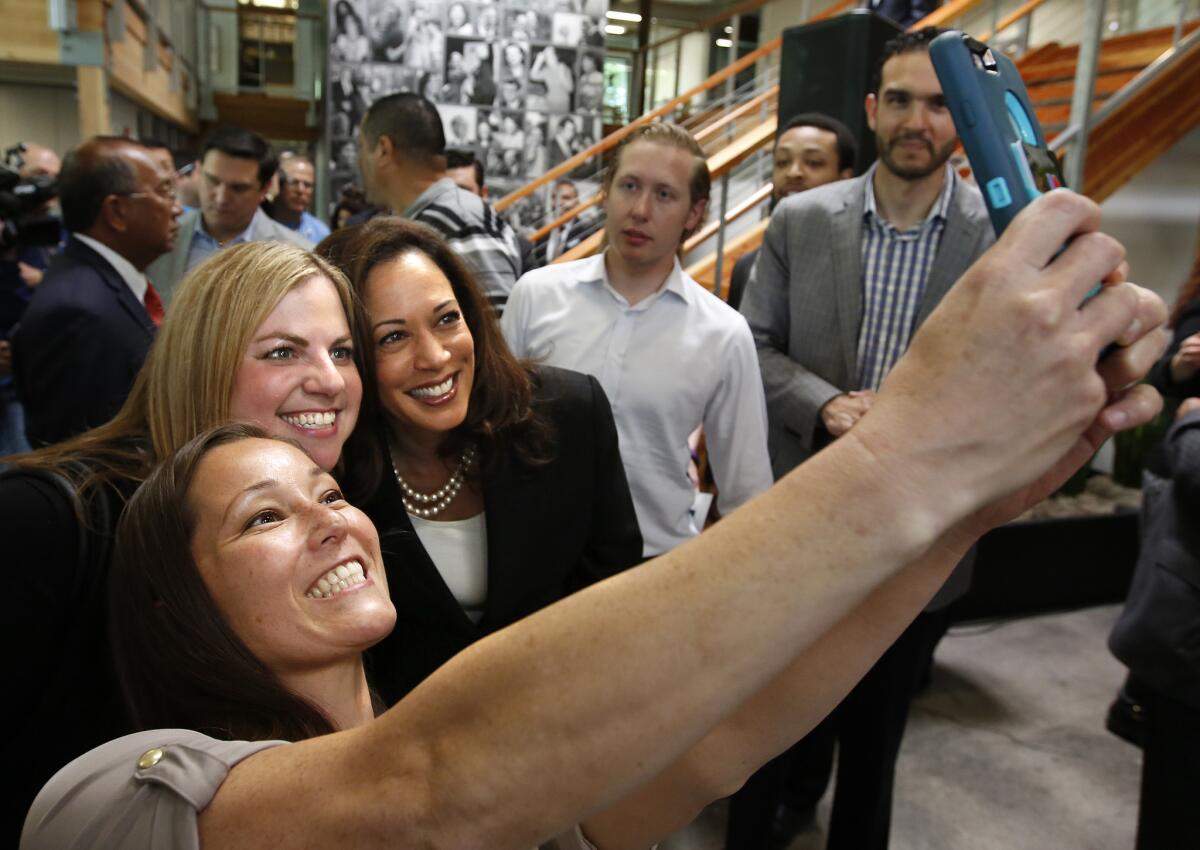These California mega-donors haven’t given a penny in the U.S. Senate race

The top two Democrats in California’s U.S. Senate race have raised more than a combined $12 million for their campaigns, but many of the state’s most generous and loyal campaign donors have yet to crack open their wallets.
During Sen. Barbara Boxer’s hard-fought 2010 campaign against Republican challenger Carly Fiorina, her supporters helped her secure reelection with more than $10 million in individual contributions in 2009-2010.
Those same donors haven’t been nearly as generous to the two top Democrats running to succeed Boxer, who is retiring after four terms. So far, contributors from the 2010 race have given just over $1 million to state Atty. Gen. Kamala Harris’ campaign and roughly $100,000 to Rep. Loretta Sanchez of Orange, according to a Times analysis of federal campaign finance reports detailing contributions up to March 31.
And while state gubernatorial campaigns are a totally different animal than running for U.S. Senate, some Californians who wrote big checks for Gov. Jerry Brown’s 2010 and 2014 campaigns and Lt. Gov. Gavin Newsom’s current 2018 campaign haven’t given a penny to either Harris or Sanchez.
Among the donors on the sidelines through May 18, the most recent filing period:
- Whole Foods Chief Executive Walter Robb of San Rafael, who contributed $106,000 to Brown, $29,000 to Newsom and $10,800 to Sen. Dianne Feinstein.
- Yahoo Chief Executive Marissa Mayer of Palo Alto, who gave Brown and Newsom $54,000 apiece.
- Peter Lowy of Los Angeles, the co-chief executive of international shopping center chain Westfield Group, who gave Brown $51,800 and Newsom $56,400.
- Entertainment industry billionaire David Geffen of Los Angeles, who has contributed more than $100,000 to Brown’s campaigns and donated hundreds of thousands of dollars to congressional and presidential candidates over the last two decades.
- Reed Hastings of Santa Cruz, the co-founder of Netflix, who has donated more than $100,000 to Brown’s campaigns and millions more to charter school political committees in the state.
Political consultant Rose Kapolczynski, who was Boxer’s campaign manager, said there were plenty of reasons why some die-hard Democratic donors were sitting out the Senate race.
“Some Democratic donors may not feel there’s a reason to give in a race when the two leading candidates are Democrats,” Kapolczynski said. “This isn’t a situation where a Republican may get elected to the Senate, as we faced in 2010.”
Under California’s “top two” primary system, the two candidates who receive the most votes in the June 7 primary election will face off in the November election, regardless of political party. If the polls are any indication, Harris and Sanchez will meet again Nov. 8.
Harris has been the solid front-runner since she launched her campaign in January 2015, and Sanchez has held a tenuous hold on second place for months, recent opinion polls show. Voter support for the other 32 candidates on the ballot, including the top three Republicans in the race, have been mired in the single digits at best.
“It’s difficult to raise money when everyone assumes you’re advancing to the runoff no matter what,” Kapolczynski said.
Technology entrepreneur and former Stanford professor John Koza of Palo Alto, who donated $20,000 to Brown’s campaigns and has been a generous, longtime supporter of California Democrats in Congress, said he hadn’t yet weighed in on the Senate race because it was early in the political season.
“I only occasionally get involved in primaries, and both Harris and Sanchez are well-qualified and appealing,” Koza said in an email.
Jerry Fiddler of Berkeley, a clean technology investor who co-founded the software company Wind River Systems, was succinct about why he hasn’t written a check for the Senate race, joking that he has “just been lazy.”
Among the donors who have supported Boxer, Brown or Newsom over the last six years and wrote checks to a Senate candidate, the vast majority are supporting Harris. That includes some longtime contributors: Hollywood moguls Jeffrey Katzenberg and Steven Spielberg; Los Angeles developer and philanthropist Eli Broad; Google executive Eric Schmidt; and members of the Pritzker family, heirs to the Hyatt hotel fortune.
------------
FOR THE RECORD
June 2, 9:35 p.m. An earlier version of this story said Eric Schmidt is the chief executive of Facebook. He is an executive at Google.
------------
Harris has dominated in fundraising in the race, raising just under $10 million in individual contributions compared to the just over $2 million raised by Sanchez. Among the top three Republicans in the race, George “Duf” Sundheim has raised $475,000, Tom Del Beccaro has brought in $239,000 and Silicon Valley software developer Ron Unz raised $52,000, according to reports filed with the Federal Election Commission.
Bill Carrick, Sanchez’s political consultant, said any candidate running for an open Senate seat in a state as massive as California faces an extremely difficult task when it comes to raising money.
“It’s a scramble, and I thought from the beginning it would be a scramble,” said Carrick, who has been a longtime political consultant to Feinstein.
Harris has a distinct advantage over Sanchez given she has run two successful campaigns for state attorney general and has built a statewide base of donors.
The federal campaign contribution limits on individual donors in a U.S. Senate race are much stricter than statewide. Donors to the Senate campaign can give only $2,700 for the primary and $2,700 for the general election. California currently limits individual contributions to gubernatorial candidates to $28,200 per election and attorney general and other statewide offices to $7,000 per election.
Twitter: @philwillon
ALSO:
California’s next senator could be a Latina. Will her past mistakes get in the way?
How race helped shape the politics of Senate candidate Kamala Harris
Here’s how you spend $600,000 on 19 consultants in a Senate race
Controversial English-only crusader sets his sights on California’s Senate race
Tom Del Beccaro is forging his own version of the California GOP
Duf Sundheim resists the moderate label
Updates on California politics
More to Read
Get the L.A. Times Politics newsletter
Deeply reported insights into legislation, politics and policy from Sacramento, Washington and beyond. In your inbox three times per week.
You may occasionally receive promotional content from the Los Angeles Times.












